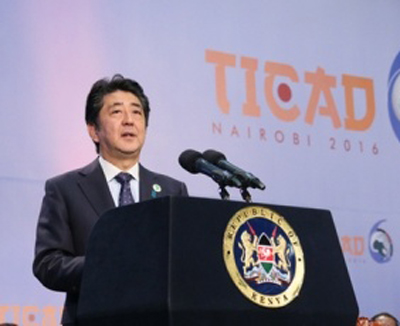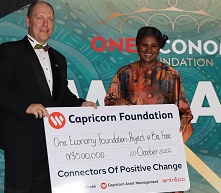
African economies test Japanese development commitment

TICAD VI Nairobi Declaration boosting economic ties
By Kingsley Ighobor
http://www.un.org/africarenewal/
19 December 2016 – African leaders who took part in the Sixth Tokyo International Conference on Africa’s Development (TICAD VI), in August in Nairobi, Kenya, are eager to test the latest Japanese commitment to investment and development of the continent and how it will improve the lives of Africans.
Japanese Prime Minister Shinzo Abe, who co-chaired TICAD VI with Kenyan President, Uhuru Kenyatta, had come with leaders of 77 Japanese companies to the event in Nairobi. Also attending were presidents Jacob Zuma of South Africa, Muhammadu Buhari of Nigeria, Macky Sall of Senegal, Ellen Johnson-Sirleaf of Liberia and Filipe Nyusi of Mozambique.
This historic meeting provided a networking platform between 1700 business representatives from Japan and about 2000 from Africa. More than 300 top executives also attended.
The TICAD VI meeting organized by the Japanese Government, the UN’s Office of the Special Adviser on Africa, the UN Development Programme, the African Union (AU) and the World Bank, was the first on the African continent since it was launched in 1993. In response to pressure from African participants, meetings will from now on be held every three years instead of every five years, with alternate hosting by Japan and Africa.
As with all five previous meetings, leaders used this year’s TICAD to deliberate on Africa’s socio-economic development, using the yardsticks of the Sustainable Development Goals and Agenda 2063, a set of aspirations adopted by African leaders to transform the continent.
Prime Minister Abe set the tone in his opening address: “Africa is now up and running, aiming at long-range goals, aspiring to be a certain kind of continent with certain kinds of countries in 2063.”
In addition to agriculture and infrastructure development, participants said improved trade can boost Africa’s industrialization. The 77 Japanese companies whose leaders accompanied Mr. Abe to Nairobi were big and not-so-big corporations, indicating an attempt to connect with Africa at varying levels of trade and investment.
The two-day meeting was as much a jamboree as it was a marketplace of ideas. Companies set up tents to advertise products and services even as political and business leaders were punting their individual countries’ attractiveness to foreign investors. But it was the announcement of Japan’s commitment to mobilize US$30 billion for Africa’s infrastructure, health care system and security that grabbed the headlines.
There was also a package to train or “empower” up to 10 million Africans over the next three years, including 1500 experts under Japan’s African Business Education Initiative for Youth (ABE Initiative), and an additional 30,000 engineers by 2018 to support “the foundations of industry,” said Mr. Abe.
Participants considered three priority areas for Africa’s development. The first is economic diversification and industrialization, which require investments in roads, ports, energy and food value chains. The second is building a resilient health system, an issue that gained urgency following the 2014 Ebola outbreak and the inability of the health systems of Guinea, Liberia and Sierra Leone to respond to the epidemic.
And finally, achieving social stability, which will require leaders to tackle socio-economic instability and climate change disasters through job creation for women and the youth, disaster risk management and others. The hope is that economic stability will diminish the propensity for armed insurrections.
While maintaining that Japan will not let up on supporting efforts to “resolve the issues facing Africa” such as insecurity and the plunge in commodity prices, Mr. Abe also underlined the fact that Japan’s relationship with Africa is not one-way traffic in which only one partner benefits.
“We have a feeling in our gut that in Africa, where possibilities abound, Japanese companies can grow vigorously.” Despite current economic problems, experts believe the continent’s abundant natural resources, growing population and rising middle class offer good investment opportunities for Japan’s companies.
Japan currently has a balance-of-trade advantage over Africa. In 2015 its exports to Africa were valued at US$11.6 billion, while imports were valued at US$8.5 billion, according to the Japan External Trade Organization.
Mr Abe announced that US$10 billion of the expected US$30 billion would be injected into a three-year African Infrastructure Plan targeting projects in education, energy, urban transport (roads and ports), health, agriculture and tourism. The funds will be channelled through the African Development Bank to boost Africa’s electricity generation by 2,000 megawatts and connect 3 million homes to electricity by 2022.
The next TICAD will be held in 2019 in Tokyo.











































